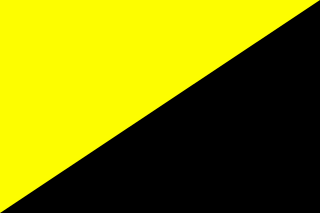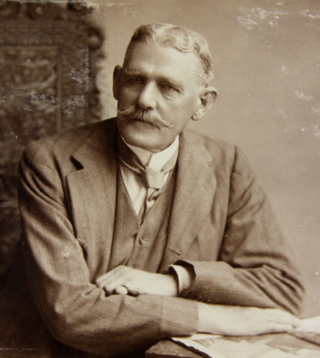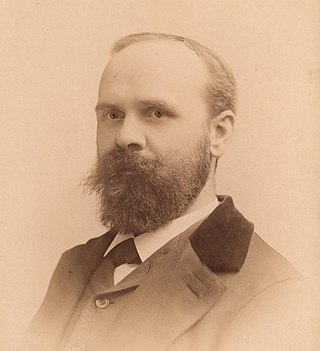Related Research Articles

Anarcho-capitalism is an anti-statist, libertarian, and anti-political philosophy and economic theory that seeks to abolish centralized states in favor of stateless societies with systems of private property enforced by private agencies, the non-aggression principle, free markets and the right-libertarian interpretation of self-ownership, which extends the concept to include control of private property as part of the self. In the absence of statute, anarcho-capitalists hold that society tends to contractually self-regulate and civilize through participation in the free market, which they describe as a voluntary society involving the voluntary exchange of services and goods. In a theoretical anarcho-capitalist society, the system of private property would still exist and be enforced by private defense agencies and/or insurance companies selected by customers, which would operate competitively in a market and fulfill the roles of courts and the police.
Individualist anarchism is the branch of anarchism that emphasizes the individual and their will over external determinants such as groups, society, traditions and ideological systems. Although usually contrasted to social anarchism, both individualist and social anarchism have influenced each other. Some anarcho-capitalists claim anarcho-capitalism is part of the individualist anarchist tradition while others disagree and claim individualist anarchism is only part of the socialist movement and part of the libertarian socialist tradition. Mutualism, an economic theory sometimes considered a synthesis of communism and property, has been considered individualist anarchism and other times part of social anarchism. Many anarcho-communists regard themselves as radical individualists, seeing anarcho-communism as the best social system for the realization of individual freedom. Economically, while European individualist anarchists are pluralists who advocate anarchism without adjectives and synthesis anarchism, ranging from anarcho-communist to mutualist economic types, most American individualist anarchists of the 19th century advocated mutualism, a libertarian socialist form of market socialism, or a free-market socialist form of classical economics. Individualist anarchists are opposed to property that violates the entitlement theory of justice, that is, gives privilege due to unjust acquisition or exchange, and thus is exploitative, seeking to "destroy the tyranny of capital, — that is, of property" by mutual credit.

Individualism is the moral stance, political philosophy, ideology and social outlook that emphasizes the intrinsic worth of the individual. Individualists promote the realisation of one's goals and desires, valuing independence and self-reliance, and advocating that the interests of the individual should gain precedence over the state or a social group, while opposing external interference upon one's own interests by society or institutions such as the government. Individualism is often defined in contrast to totalitarianism, collectivism and more corporate social forms.
Anarcho-communism, also known as anarchist communism, is a political philosophy and anarchist school of thought that advocates communism. It calls for the abolition of private property but retains personal property and collectively-owned items, goods, and services. It supports social ownership of property and direct democracy among other horizontal networks for the allocation of production and consumption based on the guiding principle "From each according to his ability, to each according to his needs".
Individualist feminism is a libertarian feminist tradition that emphasizes individualism, personal autonomy, choice, consent, freedom from state-sanctioned discrimination against women, and equality under the law. It also opposes what is considered political or gender feminism.

Auberon Edward William Molyneux Herbert was a British writer, theorist, philosopher, and 19th century individualist. He was a son of the 3rd Earl of Carnarvon. He was Liberal Member of Parliament for the two-member constituency of Nottingham from 1870 to 1874.
The nature of capitalism is criticized by left-wing anarchists, who reject hierarchy and advocate stateless societies based on non-hierarchical voluntary associations. Anarchism is generally defined as the libertarian philosophy which holds the state to be undesirable, unnecessary and harmful as well as opposing authoritarianism, illegitimate authority and hierarchical organization in the conduct of human relations. Capitalism is generally considered by scholars to be an economic system that includes private ownership of the means of production, creation of goods or services for profit or income, the accumulation of capital, competitive markets, voluntary exchange and wage labor which has generally been opposed by anarchists historically. Since capitalism is variously defined by sources and there is no general consensus among scholars on the definition nor on how the term should be used as a historical category, the designation is applied to a variety of historical cases, varying in time, geography, politics and culture.

The Libertarian Alliance (LA) refers to two libertarian think tanks in the UK. Originally one organisation, it split in 1982. One Libertarian Alliance was renamed "Mises UK" in 2017; the remaining Libertarian Alliance holds regular meetings in London.

Francis Richard Charteris, 10th Earl of Wemyss GCVO DL GCVO, styled as Lord Elcho between 1853 and 1883, was a British Whig politician. He founded the Liberty and Property Defence League.
Anarchism is generally defined as the political philosophy which holds the state to be undesirable, unnecessary and harmful as well as opposing authority and hierarchical organization in the conduct of human relations. Proponents of anarchism, known as anarchists, advocate stateless societies based on non-hierarchical voluntary associations. While anarchism holds the state to be undesirable, unnecessary and harmful, opposition to the state is not its central or sole definition. Anarchism can entail opposing authority or hierarchy in the conduct of all human relations.
Individualist anarchism in the United States was strongly influenced by Benjamin Tucker, Josiah Warren, Ralph Waldo Emerson, Lysander Spooner, Pierre-Joseph Proudhon, Max Stirner, Herbert Spencer and Henry David Thoreau. Other important individualist anarchists in the United States were Stephen Pearl Andrews, William Batchelder Greene, Ezra Heywood, M. E. Lazarus, John Beverley Robinson, James L. Walker, Joseph Labadie, Steven Byington and Laurance Labadie.

Wordsworth Donisthorpe was an English barrister, individualist anarchist and inventor, pioneer of cinematography and chess enthusiast.

David Wemyss, Lord Elcho and de jure 6th Earl of Wemyss, was a Scottish peer and Jacobite, attainted for his part in the 1745 Rising and deprived of titles and estates.
The following outline is provided as an overview of and topical guide to libertarianism, a political philosophy that upholds liberty as its principal objective. As a result, libertarians seek to maximize autonomy and freedom of choice, emphasizing political freedom, voluntary association and the primacy of individual judgment.
Egoist anarchism or anarcho-egoism, often shortened as simply egoism, is a school of anarchist thought that originated in the philosophy of Max Stirner, a 19th-century philosopher whose "name appears with familiar regularity in historically orientated surveys of anarchist thought as one of the earliest and best known exponents of individualist anarchism".
Individualist anarchism in Europe proceeded from the roots laid by William Godwin and soon expanded and diversified through Europe, incorporating influences from individualist anarchism in the United States. Individualist anarchism is a tradition of thought within the anarchist movement that emphasize the individual and his or her will over external determinants such as groups, society, traditions, and ideological systems. While most American individualist anarchists advocate mutualism, a libertarian socialist form of market socialism, or a free-market socialist form of classical economics, European individualist anarchists are pluralists who advocate anarchism without adjectives and synthesis anarchism, ranging from anarcho-communist to mutualist economic types.
Deryck Robert Endsleigh Abel was a British author, editor and political activist, who was born in Salisbury, Wiltshire to Frederick and Beryl Abel. He came from a family of teachers, craftsmen and clerks; he and his parents moved to North London when he was a small boy.
Social anarchism, also known as left-wing anarchism or socialist anarchism, is the branch of anarchism that sees liberty and social equality as interrelated.

Benjamin Ricketson Tucker was an American individualist anarchist and libertarian socialist. Tucker was the editor and publisher of the American individualist anarchist periodical Liberty (1881–1908). Tucker was a member of the First International, while describing his form of anarchism as "consistent Manchesterism" and stated that "the Anarchists are simply unterrified Jeffersonian Democrats."
Anarchism is the political philosophy which holds ruling classes and the state to be undesirable, unnecessary and harmful, and opposes authority and hierarchical organization in the conduct of human relations.
References
- ↑ Ryley, Peter (2013). Making Another World Possible: Anarchism, Anti-capitalism and Ecology in Late 19th and Early 20th Century Britain. Bloomsbury. pp. 60–61. ISBN 9781441153777.
- Bristow, Edward (1975). "The Liberty and Property Defence League and Individualism". Historical Journal. 18 (4): 761–789. doi:10.1017/S0018246X00008888. S2CID 159915781.